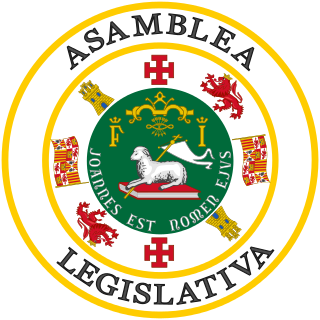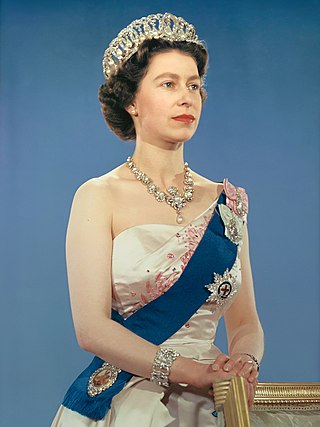 |
|---|
Elections to the House of Delegates were held in Fiji in the summer of 1871.
 |
|---|
Elections to the House of Delegates were held in Fiji in the summer of 1871.
After being crowned King of Fiji on 5 June 1871, Seru Epenisa Cakobau called for the election of members of the House of Delegates to scrutinise the proposed constitution. [1]
A total of 30 European members were elected, representing most areas with European settlement. The elected members sat alongside 30 chiefs. [1]
| Settlement | Elected members |
|---|---|
| Ba | J. Berry, H. Kennedy |
| Bua | R.L. Holmes |
| Dreketi | R.J.W. Cave |
| Koro | R. Galloway |
| Levuka | A. Levy, J.A. Manton, J.R. Ryley |
| Lomaloma | H. Emberson, W. Hennings, [lower-alpha 1] R.S. Swanston |
| Lower Rewa | Newmarsh |
| Macuata | James Stewart Butters |
| Nadroga | Robert Wilson Hamilton |
| Navua | Brown |
| Ovalau | Bateman |
| Ra | W.R. Scott |
| Savu Savu | A.D. Lang, H.B. Smith |
| Suva | C.A. Egerstrom |
| Tova and Nananu | Andrews |
| Upper Rewa | H. Eastgate, J.M. Haslett, G. Hennings |
| Source: Routledge [2] | |
The newly elected House was opened by Cakobau on 1 August. After amendments were made to the constitution, including the creation of a Privy Council and the creation of a Legislative Assembly consisting solely of Europeans, the document was signed by Cakobau on 18 August. Writs were subsequently issued for elections to the Legislative Assembly, which were held by the start of October. [1]

Fiji, officially the Republic of Fiji, is an island country in Melanesia, part of Oceania in the South Pacific Ocean. It lies about 1,100 nautical miles north-northeast of New Zealand. Fiji consists of an archipelago of more than 330 islands—of which about 110 are permanently inhabited—and more than 500 islets, amounting to a total land area of about 18,300 square kilometres (7,100 sq mi). The most outlying island group is Ono-i-Lau. About 87% of the total population of 924,610 live on the two major islands, Viti Levu and Vanua Levu. About three-quarters of Fijians live on Viti Levu's coasts: either in the capital city of Suva; or in smaller urban centres such as Nadi—where tourism is the major local industry; or in Lautoka, where the sugar-cane industry is dominant. The interior of Viti Levu is sparsely inhabited because of its terrain.
A member of parliament (MP) is the representative in parliament of the people who live in their electoral district. In many countries with bicameral parliaments, this term refers only to members of the lower house since upper house members often have a different title. The terms congressman/congresswoman or deputy are equivalent terms used in other jurisdictions. The term parliamentarian is also sometimes used for members of parliament, but this may also be used to refer to unelected government officials with specific roles in a parliament and other expert advisers on parliamentary procedure such as the Senate Parliamentarian in the United States. The term is also used to the characteristic of performing the duties of a member of a legislature, for example: "The two party leaders often disagreed on issues, but both were excellent parliamentarians and cooperated to get many good things done."

The Virginia General Assembly is the legislative body of the Commonwealth of Virginia, the oldest continuous law-making body in the Western Hemisphere, the first elected legislative assembly in the New World, and was established on July 30, 1619. The General Assembly is a bicameral body consisting of a lower house, the Virginia House of Delegates, with 100 members, and an upper house, the Senate of Virginia, with 40 members. Senators serve terms of four years, and Delegates serve two-year terms. Combined, the General Assembly consists of 140 elected representatives from an equal number of constituent districts across the commonwealth. The House of Delegates is presided over by the Speaker of the House, while the Senate is presided over by the Lieutenant Governor of Virginia. The House and Senate each elect a clerk and sergeant-at-arms. The Senate of Virginia's clerk is known as the "Clerk of the Senate".

The Colorado General Assembly is the state legislature of the State of Colorado. It is a bicameral legislature that was created by the 1876 state constitution. Its statutes are codified in the Colorado Revised Statutes (C.R.S.). The session laws are published in the Session Laws of Colorado.

Ratu Sir George Kadavulevu Cakobau was Governor-General of Fiji from 1973 to 1983. A great-grandson of Ratu Seru Epenisa Cakobau, the King of Bau who had unified all the tribes of Fiji under his reign in the mid-1800s and subsequently ceded the islands to the United Kingdom in 1874, Ratu Sir George held the traditional titles of Vunivalu of Bau and Tui Levuka and thus was considered by many as Fiji's highest-ranking traditional chief. Ratu Cakobau was appointed Governor-General in 1973, becoming the first indigenous Fijian to serve as the representative of Elizabeth II, Queen of Fiji.

The Conservative Alliance was a right-wing political party in Fiji, and a member of the ruling coalition government. It was commonly known as the CAMV, a combination of the initials of its English and Fijian names. At its annual general meeting on 17 February 2006, the party voted to dissolve itself and merge with its coalition partner, the Soqosoqo Duavata ni Lewenivanua (SDL). The President of the party at the time of its dissolution was Ratu Tanoa Cakobau, a Bauan chief, while Ratu Josefa Dimuri served as General Secretary. For legal reasons, Parliamentary members of the disbanded party maintained a separate caucus in the House of Representatives, under the leadership of Ratu Naiqama Lalabalavu, until the end of the parliamentary term, on 27 March 2006.

The Legislative Assembly of Puerto Rico is the territorial legislature of the Commonwealth of Puerto Rico, responsible for the legislative branch of the government of Puerto Rico. The Assembly is a bicameral legislature consisting of an upper house, the Senate normally composed of 27 senators, and the lower house, the House of Representatives normally consisting of 51 representatives. Eleven members of each house are elected at-large rather than from a specific legislative district with all members being elected for a four-year term without term limits.

The Maryland Senate, sometimes referred to as the Maryland State Senate, is the upper house of the General Assembly, the state legislature of the U.S. state of Maryland. Composed of 47 senators elected from an equal number of constituent single-member districts, the Senate is responsible, along with the Maryland House of Delegates, for passage of laws in Maryland, and for confirming executive appointments made by the Governor of Maryland.
The first three-quarters of the 19th century were marked by tribal warfare, incursions from neighbouring Tonga, and the increasing encroachment of foreign powers. This period also saw the rise of a warlord by the name of Seru Epenisa Cakobau, who forged the first nation-state covering all of modern Fiji in 1871, before ceding it to the United Kingdom in 1874.

The Colony of Fiji was a Crown colony that existed from 1874 to 1970 in the territory of the present-day nation of Fiji. London declined its first opportunity to annex the Kingdom of Fiji in 1852. Ratu Seru Epenisa Cakobau had offered to cede the islands, subject to being allowed to retain his Tui Viti title. His demand was unacceptable to both the British and to many of his fellow chiefs, who regarded him only as first among equals, if that. Mounting debts and threats from the United States Navy had led Cakobau to establish a constitutional monarchy with a government dominated by European settlers in 1871, following an agreement with the Australian Polynesia Company to pay his debts. The collapse of the new regime drove him to make another offer of cession in 1872, which the British accepted. On 10 October 1874, Britain began its rule of Fiji, which lasted until 10 October 1970.

The Dominion of Fiji was the official name of Fiji between October 1970 and 6 October 1987. When British rule ended in 1970, the Colony of Fiji was given independence as a Dominion, in which the British monarch, Elizabeth II, remained head of state as Queen of Fiji, represented by the Governor-General. The Republic of Fiji, removing Queen Elizabeth II as head of state, was proclaimed on 6 October 1987 after two military coups.

The monarchy of Fiji arose in the nineteenth century, when native ruler Seru Epenisa Cakobau consolidated control of the Fijian Islands in 1871 and declared himself King or paramount chief of Fiji. In 1874, he voluntarily ceded sovereignty of the islands to Britain, which made Fiji a crown colony within the British Empire.

The House of Assembly is the Legislature of Kiribati. Since 2016, it has 45 members, 44 elected for a four-year term in 23 single-seat and multi-seat constituencies and 1 non-elected delegate from the Banaban community on Rabi Island in Fiji. From 1979 to 2016, the Attorney general was an ex officio member of the legislature, until a change of the constitution modified this provision.

The Kingdom of Fiji, also known as the Kingdom of Viti, was a short-lived monarchy in Fiji. It existed from 1871 to 1874, with Ratu Seru Epenisa Cakobau as King.

The majority of Fiji's islands were formed through volcanic activity starting around 150 million years ago. Today, some geothermic activity still occurs on the is lands of Vanua Levu and Taveuni. Fiji was settled first by the Lapita culture, around 1,500–1,000 years BCE, followed by a large influx of people with predominantly Melanesian genetics about the time of the beginning of the Common Era. Europeans visited Fiji from the 17th century, and, after a brief period as an independent kingdom, the British established the Colony of Fiji in 1874. Fiji was a Crown colony until 1970, when it gained independence as the Dominion of Fiji. A republic was declared in 1987, following a series of coups d'état.

General elections were held in Fiji in 1871 to elect members of the new Legislative Assembly.

General elections were held in Fiji on 22 March and 8 April 1905.

General elections were held in Fiji in July 1937, the first in which an equal number of Europeans and Indo-Fijians were elected.

General elections were held in Fiji in August 1950. Voting took place in most locations on 26 August, and in the Lau and Lomaiviti Islands between 21 and 28 August.

The North Carolina General Assembly of 1868–1869 met in Raleigh from November 16, 1868 to April 12, 1869 with a special session from July 1, 1868 to August 24, 1868. This was the first assembly to meet after the approval of the new Constitution of North Carolina in 1868. As prescribed in this constitution, the assembly consisted of the 120 members in the North Carolina House of Representatives and 43 senators in the North Carolina Senate elected by the voters on August 6, 1868. This assembly was in control of the Republican Party and was dominated by reconstruction era politics.